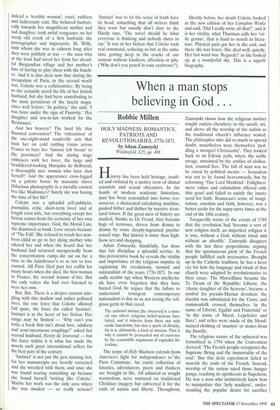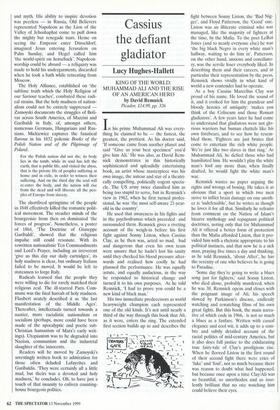When a man stops believing in God . . .
Robbie Millen
HOLY MADNESS: ROMANTICS, PATRIOTS AND REVOLUTIONARIES, 1776-1871 by Adam Zamoyski Weidenfeld, f25, pp. 498
History has been held hostage, insult- ed and violated by a motley crew of dismal scientists and sexual obsessives. In the hands of modern academic historians, man has been remoulded into homo eco- nomicus, a desiccated calculating machine, pushed hither and thither by massive struc- tural forces. If the great men of history are studied, thanks to Dr Freud, they become bags of neuroses, driven from drama to drama by some deeply-ingrained psycho- sexual urge. But history is more than high- brow sex and shopping.
Adam Zamoyski, thankfully, has done that fair discipline a splendid service. In this provocative book he reveals the vitality and importance of the religious impulse in explaining the revolutions, turmoil and nationalism of the years 1776-1871. In our sadly secular age when Western intellectu- als have even forgotten that they have buried God, he argues that the failure to understand resurgent contemporary nationalism is due to us not seeing the reli- gious germ in that creed.
The national instinct [he observes] is a natu- ral one where religious belief-systems have failed, and it inherits from these not only crude fanaticism, but also a spark of divinity, for it is, ultimately, a kind of mission. That is why it cannot be persuaded out of existence by the reasonable arguments of capitalist lib- eralism.
The scope of Holy Madness extends from America's fight for independence to" the Paris Commune. An exotic collection of fanatics, adventurers, poets and thinkers are brought to life. All admired or sought martyrdom, were nurtured on traditional Christian imagery but subverted it for the ends of nation and liberty. Throughout, Zamoyski shows how the religious instinct sought outlets elsewhere in the occult, art, and above all the worship of the nation as the traditional church's influence waned. The philosophes who did so much to spread doubt, nonetheless were themselves 'ped- dling a mongrel Christianity'. They looked back to an Edenic path, where the noble savage, untainted by the artifice of civilisa- tion, roamed free. The fall of man was to be cured by political means — Jerusalem was not to be found heavenwards, but by reforming 'Our Lord Mankind'. Enlighten- ment values and rationalism offered only thin gruel and failed to satisfy the innate need for faith. Rousseau's sense of imagi- nation, emotion and faith, however, was a better credo for the topsy-turvy times at the end of the 18th century.
Tocqueville wrote of the events of 1789 that the revolution had 'become a sort of new religion itself, an imperfect religion it is true, without a God, without ritual and without an afterlife'. Zamoyski disagrees with the last three propositions, arguing that the spontaneous piety of the French people fulfilled such necessaries. Brought up in the Catholic tradition, he has a keen eye for how the language and ritual of that church were adapted by revolutionaries to their cause. The Marseillaise became the Te Deum of the Republic; Liberte, the 'chaste daughter of the heavens', became a symbol for pseudo-Marian devotion; the tricolor was substituted for the Cross, and commonfolk crossed themselves 'in the name of Liberte, Egalit6 and Fraternite or 'in the name of Marat, Lepeletier and Bara'; and relics were made of the blood- stained clothing of 'martyrs' or stones from the Bastille.
The religious nature of the upheaval was formalised in 1794 when the Convention decreed, 'The French people recognises the Supreme Being and the immortality of the soul.' But this deist experiment failed to nourish the souls of, the French. Instead, worship of the nation sated those hunger pangs, reaching its apotheosis in Napoleon. He was a man who instinctively knew how to manipulate this 'holy madness', under- standing the popular desire for sacrifice
and myth. His ability to inspire devotion was peerless — in Russia, Old Believers represented Napoleon as the Lion of the Valley of Jehoshaphat come to pull down the mighty but renegade tsars. Heine on seeing the Emperor enter Dusseldorf, imagined Jesus entering Jerusalem on Palm Sunday, and Hegel called him 'the world-spirit on horseback'. Napoleon- worship could be absurd — a reliquary was made to hold his undergarments, discarded when he took a bath while retreating from Moscow.
The Holy Alliance, established on 'the sublime truth which the Holy Religion of our Saviour teaches', combated these radi- cal strains. But the holy madness of nation- alism could not be entirely suppressed — Zamoyski documents the struggles of Boli- var across South America, of Mazzini and Garibaldi in Italy, of, amongst others, numerous Germans, Hungarians and Rus- sians. Mickiewicz captures the fanatical flavour in his 1832 polemic Books of the Polish Nation and of the Pilgrimage of Poland.
For the Polish nation did not die; its body lies in the tomb, while its soul has left the earth, that is public life, and visited the abyss, that is the private life of peoples suffering at home and in exile, in order to witness their suffering. And on the third day the soul will re-enter the body, and the nation will rise from the dead and will liberate all the peo- ples of Europe from slavery.
The shortlived springtime of the people in 1848 effectively killed the romantic polit- ical movement. The steadier minds of the bourgeoisie from then on dominated 'the forces of progress'. Nonetheless, a poster of 1864, 'The Doctrine of Giuseppe Garibaldi', showed that the religious impulse still could resonate. With its rewritten nationalistic Ten Commandments and Lord's Prayer, including an irreverent 'give us this day our daily cartridges', its holy madness is clear, but ordinary Italians failed to be moved. It would be left to statesmen to forge Italy.
Radicals learned that the people they were willing to die for rarely matched their religious zeal. The ill-starred Paris Com- mune was the final hurrah of holy madness. Flaubert acutely described it as 'the last manifestation of the Middle Ages'. Thereafter, intellectuals turned towards a nastier, more racialistic nationalism or socialism (perhaps, more could have been made of the apocalyptic and poetic sub- Christian humanism of Marx's early writ- ings). Utopianism was to be degraded into Nazism, communism and the industrial slaughter of the innocents.
Readers will be moved by Zamoyski's arrestingly written book to admiration for those often deluded Lafayettes and Garibaldis. 'They were certainly all a little mad, but theirs was a devoted and holy madness,' he concludes. Oh, to have just a touch of that insanity to enliven counting- house bourgeois politics.



























































































 Previous page
Previous page